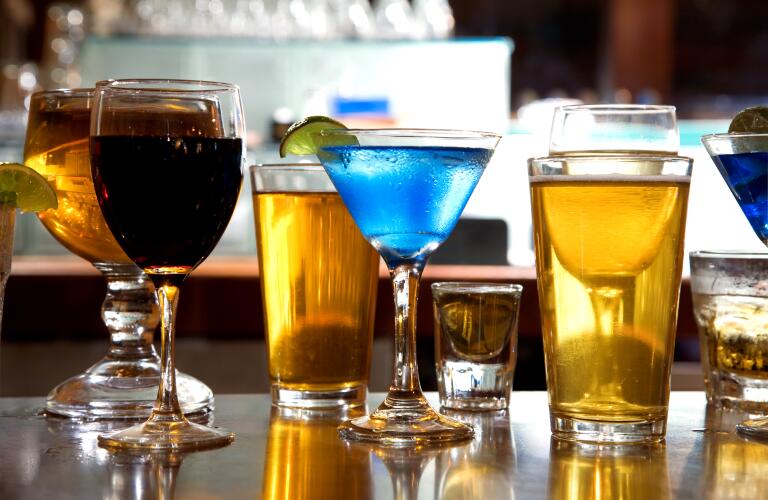
When you have a glass of wine, a beer, or your favorite mixed cocktail, the body goes through an extensive process to break down the alcohol. It does this mainly in the liver through two enzymes: alcohol dehydrogenase (ADH) and aldehyde dehydrogenase (ALDH). These enzymes help break apart the alcohol molecule so your body can eliminate it from the body.
It typically takes about one hour for the liver to break down one ‘unit’ of alcohol. But this can vary depending on your age, weight, gender, metabolism, how much you eat, the type and strength of alcohol, and any medicines you take. How your liver is functioning may also have an effect on how your body metabolizes alcohol.
Measuring Alcohol in Units
Units of alcohol are typically represented by the standard measure, alcohol by volume (ABV), which shows the amount of pure alcohol as a percentage of the total volume of liquid in a drink. You can monitor how many units you are getting by the strength and size of your drink:
- Standard glass of wine (12% ABV) = 2.1 units
- Large glass of wine (12% ABV) = 3 units
- Pint of low-strength beer (3.6% ABV) = 2 units
- Pint of high-strength beer (5.2% ABV) = 3 units
- Single measure (25 milliliters, ml) of spirits (gin, rum, tequila, whiskey, vodka) = 1 unit
If you drink a standard glass of wine, which equals 2.1 units, it will generally take your body about two hours to break down the alcohol (depending on the factors previously mentioned). A standard drink is defined as:
- 5 fl oz of wine
- 12 fl oz of regular beer
- 8 to 9 fl oz of malt liquor
- 1.5 fl oz shot of distilled spirits
Detecting Alcohol in Your System
The liver breaks down 92 to 98% of an alcoholic drink as it moves through the digestive system, filtering out toxins through the kidneys. That leaves roughly 2 to 8% of alcohol that’s eliminated through other means, such as sweat, breath and urine. This process of eliminating alcohol from your body can take many hours (though the absorption may be slightly slower when you have food in your stomach). This means if you have a few drinks in the evening, the alcohol could still be in your blood the next day. You could even be over the legal alcohol limit to drive the next day.
Some alcohol will enter the bloodstream through the stomach walls before it’s broken down, and part of it then travels to the brain. A blood test is the preferred test during DUI arrests and in rehabilitation centers that treat individuals with alcohol use disorder. It can detect alcohol in the bloodstream for up to 12 hours after the last drink. Breath tests (breathalyzer) can also determine the blood alcohol content (BAC). The higher your BAC, the more likely you are to show signs of intoxication. These tests can detect alcohol consumption about 24 hours after the last drink.
Urine tests can detect metabolized alcohol between 12 and 48 hours after drinking, depending on how much alcohol was consumed. Other tests, like a hair test, which can detect alcohol for up to 90 days, can show that you drank alcohol, but not specifically when or how much you drank.
Signs of Intoxication
With each drink, your BAC rises, and you are more likely to show signs of intoxication. These may include:
- Decreased coordination
- Lowered inhibitions
- Breathing problems
Reducing Your Risk
Drinking heavily puts people at risk for many adverse health consequences, including alcoholism and liver damage. With excessive drinking, or binge drinking the risk of overdose increases, and your breathing can become dangerously slow, or even stop. So it’s important to regularly monitor how much you are drinking and how often:
- Try not to drink more than 14 units of alcohol per week—seven standard glasses of wine (5 ounces each).
- If you drink 14 units per week, spread your drinking over three or more days.
- Be sure to go several days a week without any alcohol.
Also, keep in mind that while things like coffee, water, a shower or sleep may perk you up, they do not speed up the breakdown of alcohol, or sober you up any faster. And they will not eliminate alcohol from your blood. As long as you are consuming more alcohol than you’re eliminating, your BAC will continue to go up.
For information about alcohol use disorder, or treatment of alcohol abuse, visit SAMHA (Substance Abuse and Mental Health Services Administration).







